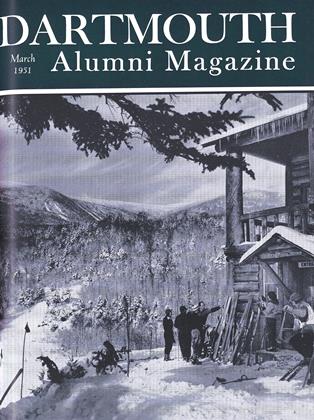By Richard Eberhart'26, Gummington Press: Cummington, Mass.1950. 8 pp., $1.00.
Bibliographically, this is an attractively hand-set and hand-printed paper-covered booklet, with, prefixed to the text, a printed etching or a basket of herbs (I hope it is a basket of herbs).
Metrically, this is a sequence of twenty numbered six-line stanzas, some of the lines being linked by rhymes or "off-rhymes," and the number of heavy stresses in a line mostly varying between three and four, though some lines might invite accentuation as pentameters.
Literarily (and importantly) this "herb basket" is a sequence of gnomic (that is, wisdomdistilling) stanzas, with a variety of ostensible themes. But these themes circle about, or are tangent to, a central question: what are we doing in writing? which is broached in the first stanza: We are fighting still to know What we are doing in writing. Are we making an engine, making It go? Are we playing with a balloon? Are we inviting Heraclitus? We are fighting; but do we know? and a central affirmation: what we can do in knowing, which is summarized in stanza 16: It is possible to wipe the slate clean. The senses require an anarchy. Knowledge is not something stated, But a red dream; to ignore The mean is to defy the norm, And wash the world to the newly seen.
It is evident at a glance that the answer to the central question is implied in this central affirmation. But to discover the entirety of that implication is likely to require a long, steady look.
More succinctly, every affirmation in these stanzas implies a question; and every question, an affirmation. Of course, as befits poetry, these vibrations in the ether of mind are mostly embodied in images. Like herbs, these images exhale a pungent fragrance. The pungence, as the wise have long known, is efficacious for healing. The fragrance, as nobody needs to be told, is the poetry. This particular basket teases and charms us with reminiscences we can almost achieve, with identifications we can almost make. And it teases us with the hope that some day soon, Mr. Eberhart may throw open to the public the gardens whence these herbs were culled. For he is, surely, a lineal descendant of A. Marvell. May he claim his heritage!
 View Full Issue
View Full Issue
More From This Issue
-
 Article
ArticleFree Enterprise in Ideas
March 1951 By HENRY STEELE COMMAGER -
 Class Notes
Class Notes1929
March 1951 By F. WILLIAM ANDRES, EDWIN C. CHINLUND, GEORCE B. REDDING6 more ... -
 Class Notes
Class Notes1905
March 1951 By GEORGE W. PUTNAM, GILBERT H. FALL, FLETCHER A. HATCH -
 Class Notes
Class Notes1918
March 1951 By ERNEST H. EARLEY, DONALD L. BARR, RICHARD A. HOLTON -
 Article
ArticleThe Undergraduate
March 1951 By PETE -
 Class Notes
Class Notes1923
March 1951 By TRUMAN T. METZEL, COLIN C. STEWART 3RD, LEON H. YOUNG JR.
F. CUDWORTH FLINT
-
 Books
BooksSADDLING PEGASUS
JANUARY 1932 By F. Cudworth Flint -
 Books
BooksTHE LANGUAGE OF POETRY,
May 1942 By F. Cudworth Flint -
 Books
BooksSPARROW HAWKS
October 1950 By F. Cudworth Flint -
 Books
BooksSELECTED POEMS
October 1951 By F. Cudworth Flint -
 Books
BooksTHE WORLD, THE WORLDLESS.
JUNE 1965 By F. CUDWORTH FLINT -
 Books
BooksTHE GEORGIAN REVOLT: RISE AND FALL OF A POETIC IDEAL, 1910-1922.
NOVEMBER 1965 By F. CUDWORTH FLINT
Books
-
 Books
BooksSidelights on American Literature
May, 1923 -
 Books
BooksCemetery
JUNE 1932 By Albert William Levi, Jr. -
 Books
BooksTHE FAR AND THE DEEP.
MARCH 1968 By CAPT. L.S. SMITH JR., USN -
 Books
BooksDREAM AND THOUGHT IN THE BUSINESS COMMUNITY, 1860-1900.
January 1957 By JAMES F. CUSICK -
 Books
BooksNotes on travelers who tread the paths that angels fear, and the road signs they post along the way.
June 1979 By R. H. R -
 Books
BooksNotes on a humanizing craft, a National Book Award, the Adamses, Avant-garde dancers, Irving Howe's tribute, and the Texas nation.
June 1976 By R.H.R.


